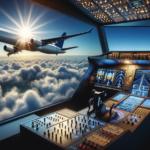The Importance of Aviation Training
Aviation training is the backbone of the aviation industry, playing a pivotal role in ensuring safety, efficiency, and innovation. With the skies becoming increasingly crowded, the need for well-trained professionals is more critical than ever. The International Air Transport Association (IATA) reports that air travel is expected to double over the next two decades, underscoring the demand for skilled pilots, air traffic controllers, and maintenance technicians.
Training programs are designed to equip individuals with the necessary skills and knowledge to handle the complexities of modern aviation. This includes understanding advanced navigation systems, mastering emergency procedures, and maintaining aircraft integrity. Moreover, training ensures that aviation professionals are up to date with the latest industry regulations and technological advancements.
In addition to technical skills, aviation training emphasizes soft skills such as communication, teamwork, and decision-making under pressure. These skills are essential for maintaining safety and efficiency in high-stress environments. Ultimately, comprehensive training programs contribute to the overall safety and reliability of air travel, which is paramount for passenger confidence and industry growth.
Types of Aviation Training Programs
Aviation training encompasses a wide range of programs tailored to different roles within the industry. These programs are designed to cater to the unique requirements of various aviation professions, ensuring that each individual receives specialized training.
Pilot training is perhaps the most well-known, involving rigorous instruction in flight theory, navigation, and hands-on flying experience. Aspiring pilots must complete ground school, simulator sessions, and in-flight training to earn their licenses. Flight schools often offer programs for different types of aircraft, from small single-engine planes to large commercial jets.
Air traffic control training is another critical area, focusing on the management of aircraft movements on the ground and in the air. Trainees learn how to use radar systems, communicate with pilots, and coordinate traffic to prevent collisions. This training is intensive, requiring a deep understanding of airspace regulations and quick decision-making skills.
Maintenance technician training is essential for ensuring aircraft safety and reliability. Technicians are trained to perform inspections, diagnose issues, and repair aircraft systems. This training includes both classroom instruction and hands-on experience, covering everything from engine maintenance to electronic systems.
Each of these training programs is crucial for maintaining the high standards of safety and efficiency that the aviation industry demands. By providing specialized training, the industry ensures that every professional is equipped to perform their role effectively.
The Future of Aviation Training
The future of aviation training is set to evolve alongside technological advancements and industry demands. Virtual reality (VR) and augmented reality (AR) are becoming integral parts of training programs, offering immersive experiences that enhance learning. These technologies allow trainees to practice scenarios in a controlled environment, improving their skills without the risks associated with real-life training.
Another trend is the increasing use of simulators, which provide realistic flight experiences without the need for actual aircraft. Simulators are cost-effective and allow for a wide range of scenarios to be practiced, from routine operations to emergency situations. This flexibility makes them an invaluable tool in aviation training.
Moreover, the growing focus on sustainability in aviation is influencing training programs. Trainees are now learning about fuel-efficient flying techniques and the importance of reducing carbon emissions. This shift reflects the industry’s commitment to environmental responsibility and prepares future professionals to contribute to sustainable aviation practices.
As the aviation industry continues to grow, training programs will need to adapt to new challenges and opportunities. By embracing innovative technologies and focusing on sustainability, aviation training will continue to play a vital role in shaping the future of air travel.
Conclusion: The Vital Role of Aviation Training
Aviation training is an essential component of the aviation industry, ensuring safety, efficiency, and innovation. As the industry evolves, training programs must adapt to new technologies and challenges, preparing professionals for the future of air travel. By investing in comprehensive training, the aviation industry can continue to soar to new heights, providing safe and reliable transportation for millions of passengers worldwide.








